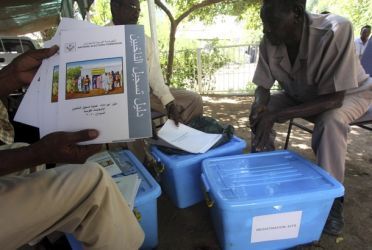Sudan’s ruling party maintains position on 2015 election
September 20, 2014 (KHARTOUM) – The presidential assistant and deputy chairman of Sudan’s ruling National Congress Party (NCP), Ibrahim Ghandour, said the call for national dialogue does not mean postponing planned elections, reiterating it is a constitutional requirement that must be met.

“The call for national dialogue does not mean reneging on our principles,” he said stressing that “does not retreat from the date of the elections”.
On Friday the head of the National Electoral Commission said the president, le parliament cannot extend their mandate, adding that postponement of elections will create constitutional vacuum and political chaos.
Opposition leaders, including those who have accepted to participate in the process, demand to postpone the elections and to form a transitional government tasked with the implementation of the outcome of the political process and organise new elections.
The NCP official went to say they are ready to negotiate anything but Shari’a laws, adding “those who want to discuss the Shari’a issue must wait until they yield a mandate from the Sudanese people to rule the country”.
Last August, the National Elections Commission (NEC) announced that the general elections will begin on 2 April 2015 and the counting operation will start on the same day.
The electoral body is expected to announce the geographical constituencies on Sunday after being drawn and submitted to the presidency.
TRANSITIONAL GOVERNMENT
Ghandour said that all political forces could join the next government if the move is approved in the national dialogue.
“We could all take part in the government through dialogue and we could give away [governance] for other [political forces] we only seek to agree on Shari’a,” he said.
He scoffed at accusations that the NCP had wasted oil revenues, wondering about the sources which funded the building of roads, bridges, dams, hospitals and electricity projects.
The NCP official stressed his party is setting an example to be followed in the practice of Shura (consultation) and democracy, saying it is the largest and strongest political party in Africa.
POPULAR ANGER
The ruling party is holding conventions at the state level before the national convention by the end of next month where it is supposed to select the party candidate for president in 2015.
One of the goals of the conventions also is to remove the old guards of the party at the state level and within the NCP structures.
Two days ago in a speech delivered in the River Nile state, Ghandour said the national dialogue is part of a number of reforms in the country decided by the NCP leadership and underlined that the renewal of the leadership in the party and different government institutions in included in this reforms.
On Saturday, Ghandour warned against the anger of the street, saying if Sudanese decided to topple the regime nothing could stop them.
“If the Sudanese people is irritated its anger cannot be contained and if they move they will not stop,” he said in a message addressed to the party members insinuating that need to end the internal divisions and to accept change within the party.
In September 2013, Sudan witnessed the largest protests against the current regime which came to power in 1989. Thousands of demonstrators took to the streets in various Sudanese states in protest against the government decision to lift fuel subsidies.
The National Intelligence and Security Services (NISS) used excessive force against protests leading to death of at least 200 protestors.
The governor of the Northern state, Ibrahim Al-Khidir, for his part acknowledged existence of organisational problems within the NCP in the state, emphasising ability to address them with the help of the party leadership.
(ST)
